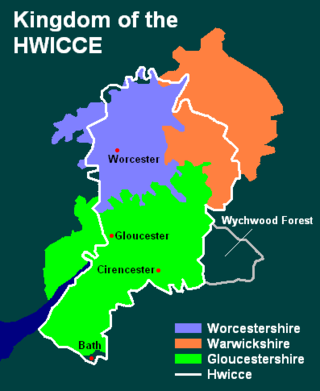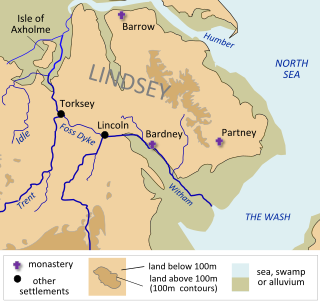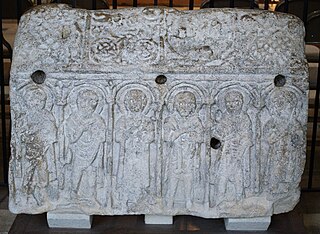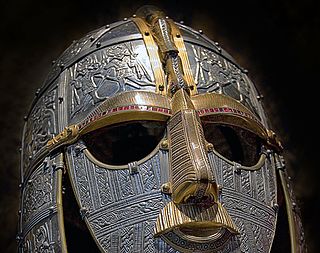Related Research Articles
Ælle is recorded in much later medieval sources as the first king of the South Saxons, reigning in what is now called Sussex, England, from 477 to perhaps as late as 514.

Bretwalda is an Old English word. The first record comes from the late 9th-century Anglo-Saxon Chronicle. It is given to some of the rulers of Anglo-Saxon kingdoms from the 5th century onwards who had achieved overlordship of some or all of the other Anglo-Saxon kingdoms. It is unclear whether the word dates back to the 5th century and was used by the kings themselves or whether it is a later, 9th-century, invention. The term bretwalda also appears in a 10th-century charter of Æthelstan. The literal meaning of the word is disputed and may translate to either 'wide-ruler' or 'Britain-ruler'.

The Kingdom of the East Saxons, referred to as the Kingdom of Essex, was one of the seven traditional kingdoms of the Anglo-Saxon Heptarchy. It was founded in the 6th century and covered the territory later occupied by the counties of Essex, Middlesex, much of Hertfordshire and west Kent. The last king of Essex was Sigered of Essex, who in 825 ceded the kingdom to Ecgberht, King of Wessex.

Offa was King of Mercia, a kingdom of Anglo-Saxon England, from 757 until his death in 796. The son of Thingfrith and a descendant of Eowa, Offa came to the throne after a period of civil war following the assassination of Æthelbald. Offa defeated the other claimant, Beornred. In the early years of Offa's reign, it is likely that he consolidated his control of Midland peoples such as the Hwicce and the Magonsæte. Taking advantage of instability in the kingdom of Kent to establish himself as overlord, Offa also controlled Sussex by 771, though his authority did not remain unchallenged in either territory. In the 780s he extended Mercian Supremacy over most of southern England, allying with Beorhtric of Wessex, who married Offa's daughter Eadburh, and regained complete control of the southeast. He also became the overlord of East Anglia and had King Æthelberht II of East Anglia beheaded in 794, perhaps for rebelling against him.

Ecgberht, also spelled Egbert, Ecgbert, Ecgbriht, Ecgbeorht, and Ecbert, was King of Wessex from 802 until his death in 839. His father was King Ealhmund of Kent. In the 780s, Ecgberht was forced into exile to Charlemagne's court in the Frankish Empire by the kings Offa of Mercia and Beorhtric of Wessex, but on Beorhtric's death in 802, Ecgberht returned and took the throne.

The Kingdom of the South Saxons, today referred to as the Kingdom of Sussex, was one of the seven traditional kingdoms of the Heptarchy of Anglo-Saxon England. On the south coast of the island of Great Britain, it was originally a sixth-century Saxon colony and later an independent kingdom. The kingdom remains one of the least known of the Anglo-Saxon polities, with no surviving king-list, several local rulers and less centralisation than other Anglo-Saxon kingdoms. The South Saxons were ruled by the kings of Sussex until the country was annexed by Wessex, probably in 827, in the aftermath of the Battle of Ellendun. In 860 Sussex was ruled by the kings of Wessex, and by 927 all remaining Anglo-Saxon kingdoms were ruled by them as part of the new kingdom of England.

The Battle of Deorham is portrayed by the Anglo-Saxon Chronicle as an important military encounter between the West Saxons and the Britons in the West Country in 577. The Chronicle depicts the battle as a major victory for Wessex's forces, led by Ceawlin and one Cuthwine, resulting in the capture of the Romano-British towns of Glevum (Gloucester), Corinium Dobunnorum (Cirencester), and Aquae Sulis (Bath).

Æthelbald was the King of Mercia, in what is now the English Midlands from 716 until he was killed in 757. Æthelbald was the son of Alweo and thus a grandson of King Eowa. Æthelbald came to the throne after the death of his cousin, King Ceolred, who had driven him into exile. During his long reign, Mercia became the dominant kingdom of the Anglo-Saxons, and recovered the position of pre-eminence it had enjoyed during the strong reigns of Mercian kings Penda and Wulfhere between about 628 and 675.
Cynric was King of Wessex from 534 to 560. Everything known about him comes from the Anglo-Saxon Chronicle. There, he is stated to have been the son of Cerdic, who is considered the founder of the kingdom of Wessex. However, the Anglian King-list and parts of the West Saxon Genealogical Regnal List, instead says that Cynric was the son of Cerdic's son Creoda. Similarly, the paternal genealogy of Alfred the Great given in Asser's The Life of King Alfred, includes the name Creoda, while the account of the king's maternal ancestry in the same work calls Cynric son of Cerdic.

Hwicce was a kingdom in Anglo-Saxon England. According to the Anglo-Saxon Chronicle, the kingdom was established in 577, after the Battle of Deorham. After 628, the kingdom became a client or sub-kingdom of Mercia as a result of the Battle of Cirencester.

The Kingdom of Lindsey or Linnuis was a lesser Anglo-Saxon kingdom, which was absorbed into Northumbria in the 7th century. The name Lindsey derives from the Old English toponym Lindesege, meaning "Isle of Lind". Lindum Colonia was the Roman name of the settlement which is now the City of Lincoln in Lincolnshire. Lindum was a Latinised form of a native Brittonic name which has been reconstructed as *Lindon.

Bilston is a market town in the City of Wolverhampton in the West Midlands, England. It is close to the borders of Sandwell and Walsall. The nearest towns are Darlaston, Wednesbury, and Willenhall. Historically in Staffordshire, three wards of Wolverhampton City Council now cover the town: Bilston East and Bilston North, which almost entirely comprise parts of the historic Borough of Bilston, and Ettingshall, which comprises a part of Bilston and parts of Wolverhampton.
Oisc, or, in a later spelling, Ēsc was, if he existed, an early king of Kent and, according to Bede, the eponymous founder of the tribe known as Oiscingas (early Old English.

Medeshamstede was the name of Peterborough in the Anglo-Saxon period. It was the site of a monastery founded around the middle of the 7th century, which was an important feature in the kingdom of Mercia from the outset. Little is known of its founder and first abbot, Sexwulf, though he was himself an important figure, and later became bishop of Mercia. Medeshamstede soon acquired a string of daughter churches, and was a centre for an Anglo-Saxon sculptural style.
Natanleod, according to the Anglo-Saxon Chronicle, was a king of the Britons. His inclusion in the Chronicle is believed to be the product of folk etymology.
The Haestingas, Heastingas or Hæstingas were one of the tribes of Anglo-Saxon Britain. Not very much is known about them. They settled in what became East Sussex sometime before the end of the 8th century. A 12th-century source suggested that they were conquered by Offa of Mercia, in 771. They were also recorded in the Anglo-Saxon Chronicle (ASC) as being an autonomous grouping as late as the 11th century.
Cymenshore was a place in Southern England where, according to the Anglo-Saxon Chronicle, Ælle of Sussex landed in AD 477 and battled the Britons with his three sons Cymen, Wlencing and Cissa, after the first of whom Cymenshore was held to have been named. The spelling Cymenshore is a scholarly modernisation of the Old English Cȳmenes ōra, which is now lost. Its location is unclear but was probably near Selsey.
Ælfgifu of Shaftesbury was the first wife of King Edmund I. She was Queen of the English from her marriage in around 939 until her death in 944. Ælfgifu and Edmund were the parents of two future English kings, Eadwig and Edgar. Like her mother Wynflaed, Ælfgifu had a close and special if unknown connection with the royal nunnery of Shaftesbury (Dorset), founded by King Alfred, where she was buried and soon revered as a saint. According to a pre-Conquest tradition from Winchester, her feast day is 18 May.

The settlement of Great Britain by diverse Germanic peoples led to the development of a new Anglo-Saxon cultural identity and shared Germanic language, Old English, which was most closely related to Old Frisian on the other side of the North Sea. The first Germanic-speakers to settle permanently are likely to have been soldiers recruited by the Roman administration, possibly already in the fourth century or earlier. In the early fifth century, after the end of Roman rule in Britain and the breakdown of the Roman economy, larger numbers arrived and their impact upon local culture and politics increased.
References
- ↑ Charter S 860
- ↑ Charter S 1380
- ↑ Johnston, James B. (1915) The Place-Names of England and Wales. London: John Murray